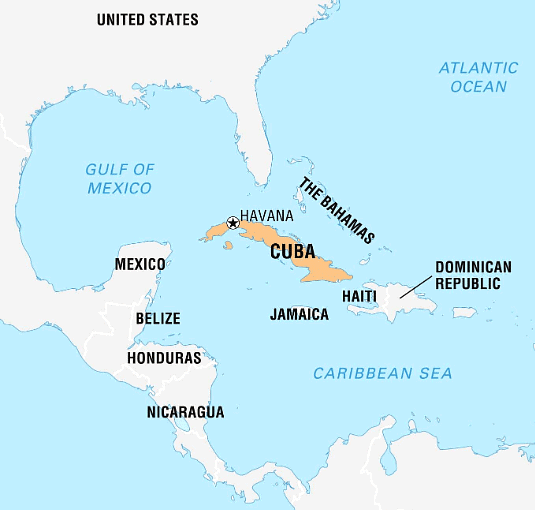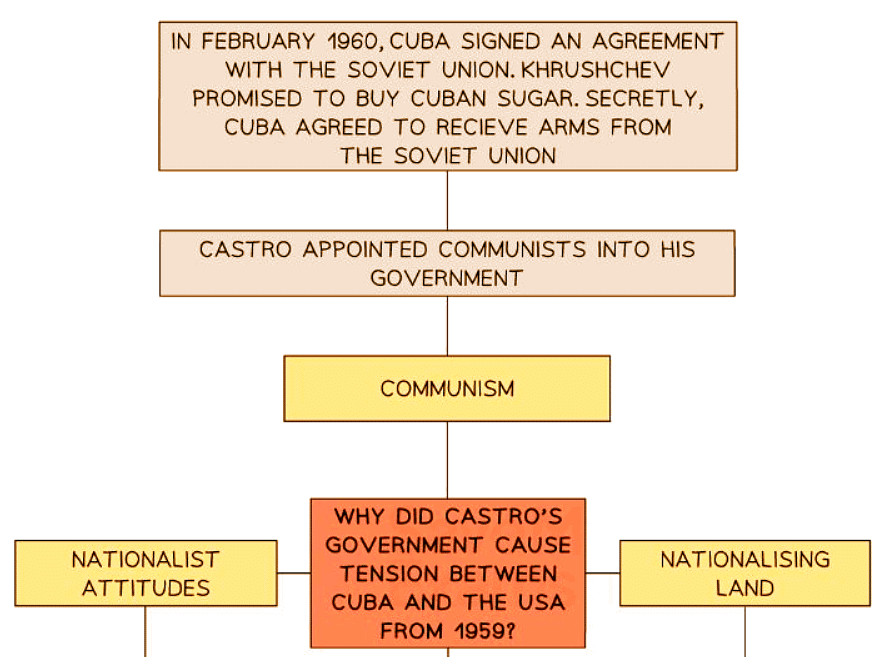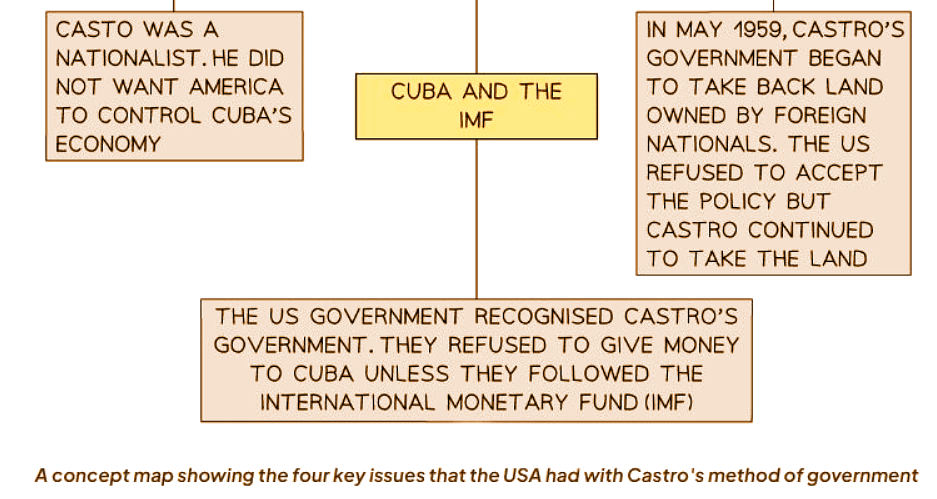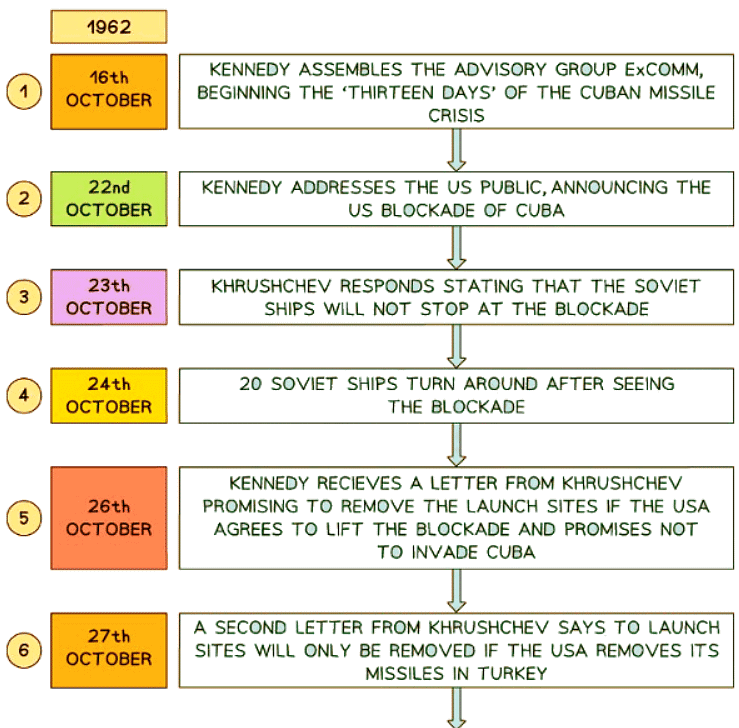Class 10 Exam > Class 10 Notes > History for GCSE/IGCSE > The USA & Events in Cuba, 1959–62
The USA & Events in Cuba, 1959–62 | History for GCSE/IGCSE - Class 10 PDF Download
| Table of contents |

|
| Causes of the Cuban Missile Crisis |

|
| The Cuban Revolution |

|
| The Events of the Cuban Missile Crisis |

|
| Consequences of the Cuban Missile Crisis |

|
Causes of the Cuban Missile Crisis
 A map showing Cuba’s proximity to the USA
A map showing Cuba’s proximity to the USA

Key Points:
- The USA's dependence on Cuba's sugar and tobacco exports.
- Control of Cuba's sugar trade by US businesses.
- Ownership of Cuba's oil refineries, railways, and electricity by the US.
- Consequently, the United States made efforts to influence Cuba's political landscape.
- In 1933, the US government backed a military takeover led by Sergeant Fulgencio Batista.
- Batista assumed the presidency and engaged in corrupt practices:
- He halted elections and disregarded the Cuban Constitution.
- Under his rule, US businesses and wealthy Cubans thrived, neglecting the impoverished segments of society.
- American mobsters were allowed to establish illicit operations in Cuba.
- Despite Batista's corruption, the USA turned a blind eye as US businesses benefited.
- Subsequently, the US government supplied Batista with weapons to maintain control over Cuba.
The Cuban Revolution
- Fidel Castro enlisted Che Guevara to participate in his rebellion against the Cuban government.
- Castro initiated a campaign of guerrilla warfare against the ruling regime in Cuba.
- In 1958, the global press lent support to the Cuban revolutionaries, prompting the US government to cease its financial and military backing of Batista's regime.
- On January 1, 1959, Castro and Guevara's troops overpowered Batista's forces. The insurgents successfully advanced to Havana, the capital of Cuba, leading to Batista's retreat to the Dominican Republic.
- The rebels successfully reached Havana.
- Batista fled to the Dominican Republic.
- Subsequently, in 1959, Castro established a new administration, which faced numerous challenges from the US government.


- Before deciding, Kennedy had to consider:
- The American public's reaction to missiles in Cuba.
- Minimal government response could lead to widespread panic in the USA.
- The necessity to uphold the policy of containment.
- The impact of his decision on upcoming election results.
- The November elections for the US Congress.
- Kennedy knew that ineffective handling of the Cuba situation could harm the success of his political allies, the Democrats.
- He had to consider the effect of his decision on other Cold War issues.
- Kennedy was concerned that a strong response to Cuba might provoke Khrushchev to act more aggressively regarding Berlin.
- Kennedy faced limited options for dealing with Cuba.
- The US government had previously attempted an invasion during the Bay of Pigs incident in 1961.
- He realized this would be unpopular in Cuba and could spark significant internal conflict.
- Bombing Cuba would portray the USA as aggressive.
- Depending on the type of bomb used, it could result in numerous civilian casualties in Cuba.
- Given that the Cold War was also a propaganda war, Kennedy needed to choose a course of action that would not harm the USA's international reputation.
Question for The USA & Events in Cuba, 1959–62Try yourself: What was one of the causes of the Cuban Missile Crisis?View Solution
The Events of the Cuban Missile Crisis


Consequences of the Cuban Missile Crisis
- The Cuban Missile Crisis had several positive and negative consequences for the USA

The document The USA & Events in Cuba, 1959–62 | History for GCSE/IGCSE - Class 10 is a part of the Class 10 Course History for GCSE/IGCSE.
All you need of Class 10 at this link: Class 10
|
81 videos|88 docs|18 tests
|
FAQs on The USA & Events in Cuba, 1959–62 - History for GCSE/IGCSE - Class 10
| 1. What were the main causes of the Cuban Missile Crisis? |  |
Ans. The main causes of the Cuban Missile Crisis were the Cuban Revolution, which led to the establishment of a communist government in Cuba, and the deployment of Soviet missiles in Cuba, seen as a threat by the United States.
| 2. What were the key events that took place during the Cuban Missile Crisis? |  |
Ans. The key events of the Cuban Missile Crisis included the discovery of Soviet missiles in Cuba by U.S. intelligence, President Kennedy's establishment of a naval blockade around Cuba, negotiations between the U.S. and the Soviet Union, and the eventual removal of the missiles from Cuba.
| 3. What were the consequences of the Cuban Missile Crisis? |  |
Ans. The consequences of the Cuban Missile Crisis included a nuclear standoff between the U.S. and the Soviet Union, increased tensions between the two superpowers, the establishment of a direct hotline between the White House and the Kremlin, and a commitment to arms control and disarmament agreements.
| 4. How did the USA's involvement in events in Cuba from 1959-1962 contribute to the Cuban Missile Crisis? |  |
Ans. The USA's involvement in events in Cuba from 1959-1962, including the failed Bay of Pigs invasion and the imposition of economic sanctions, contributed to the Cuban Missile Crisis by increasing hostilities between the U.S. and Cuba, as well as between the U.S. and the Soviet Union.
| 5. How did the Cuban Missile Crisis impact U.S.-Soviet relations in the long term? |  |
Ans. The Cuban Missile Crisis had a lasting impact on U.S.-Soviet relations by leading to a period of détente, or relaxation of tensions, between the two superpowers. It also highlighted the dangers of nuclear war and prompted both countries to pursue arms control measures to prevent future crises.
Related Searches



















